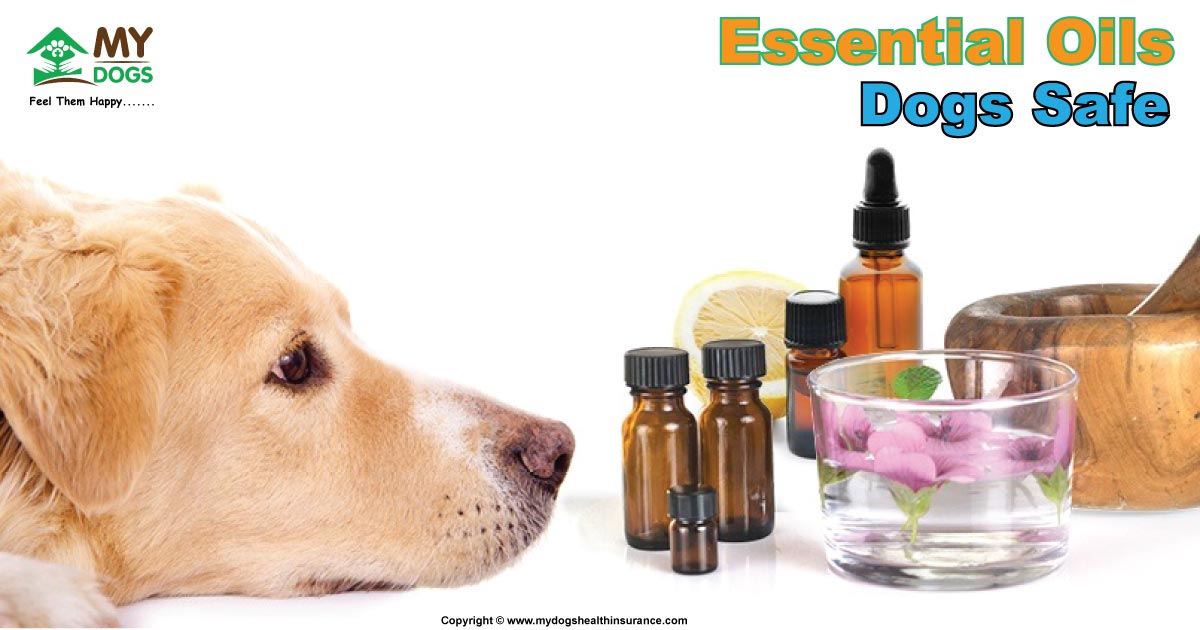Just like humans, dogs can benefit from the natural healing properties of fresh herbal for dogs, which can provide a range of health benefits such as improving digestion, reducing inflammation, and boosting the immune system. One of the easiest ways to incorporate fresh herbs into your dog’s diet is to simply add them to their meals. Some popular herbal for dogs include parsley, basil, oregano, and thyme. These herbs can be finely chopped and mixed in with your dog’s regular food, or they can be used to flavor homemade treats.
Some Commonly Used, Safe Herbal for Dogs

Fresh herbs like basil, parsley, and mint can be added to a dog’s diet in small amounts, while others like turmeric and ginger can be used as a supplement or added to homemade dog treats. However, it’s essential to make sure that the herbs are safe for dogs and used in moderation. Using fresh herbs can be a great way to enhance your dog’s diet and provide them with natural support for their overall health.
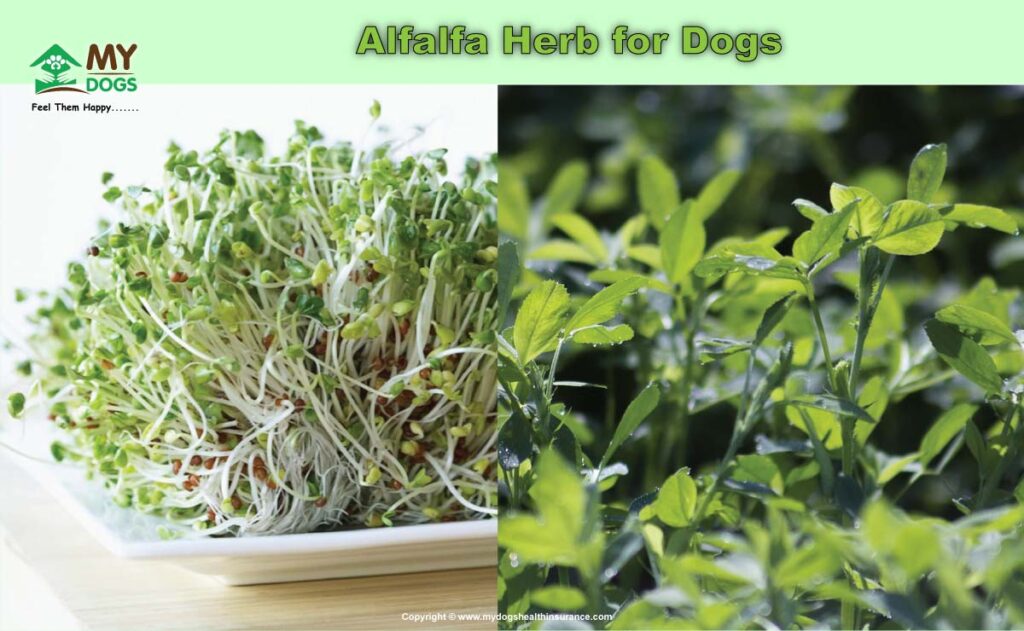
Alfalfa :
Alfalfa For Dogs:
- Contains many vitamins and minerals, used as a tonic and Cleanser for the system.
- A kidney cleanser, and alkalinize of the whole system.
- Contains estrogenic compounds and may be of use to stimulate milk in female dogs.
- Avoid large doses.
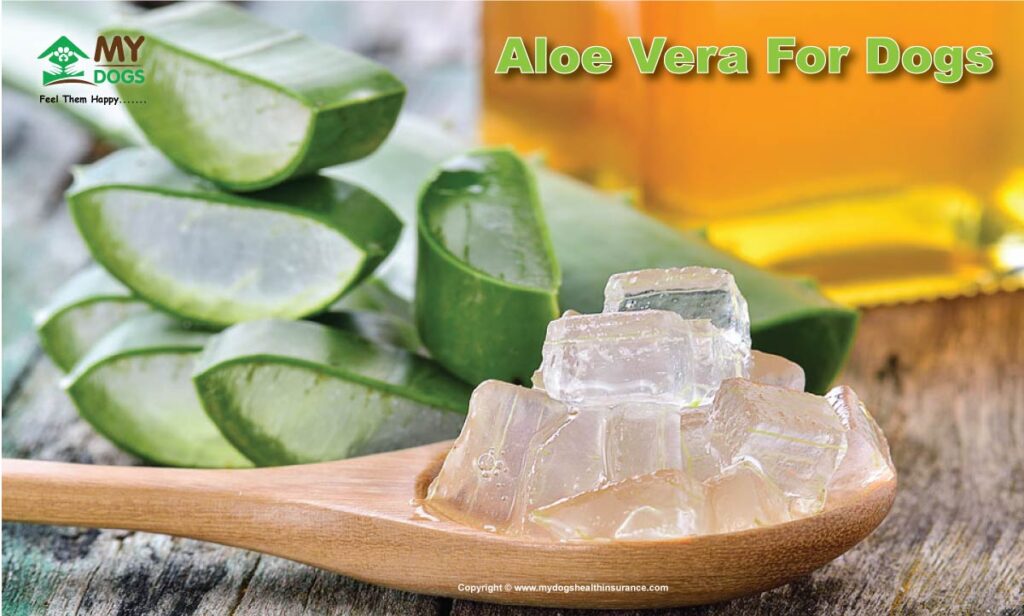
Aloe Vera:
Aloe Vera For Dogs:
- Antibacterial and antifungal, and also a blood cleanser.
- Very useful externally as a wound and especially a burn Treatment; use the gel directly from a freshly cut leaf.
- Used internally as a laxative as well as to soothe the digestive tract and help to normalize its function. Said to Improve digestion.
- Use the diluted gel or the dried juice.
- Has immunostimulant ingredients; has been used in cats with feline leukemia with positive results.
- Do not overuse.
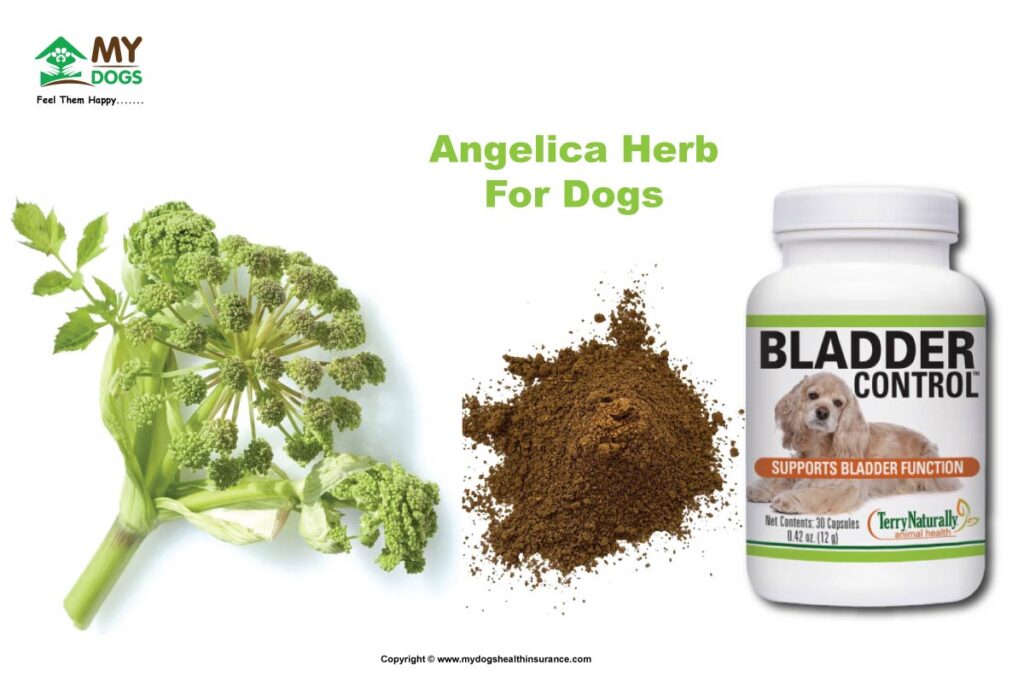
Angelica:
Angelica For Dogs
- Useful for all digestive problems including colic and Heart Burn.
- Soothes the stomach.
- Use the seeds as mild tea.
- Supports Dogs Bladder Health; Aids in preserving regular bladder function and reducing accidents in your pet.

Barley:
Barley For Dogs:
- Calms the digestive tract.
- Used in convalescence and for colitis and diarrhea.
- A general nutritive food and nerve tonic.
- Good for the bladder and kidneys.
- Boil barley grains and sieve to make barley water; the Soaked grains can also be eaten raw soak them for two days, preferably exposed to sunlight.

Basil:
Basil For Dogs:
- A strong nervous booster, a stimulant in nature, and a booster.
- Relieves nausea and severe vomiting, useful for indigestion.
- Can be applied externally as an insecticide.

Blackberry:
Blackberry For Dogs:
- An astringent tonic, which contains between 8 and 14% tannin.
- The leaves and root bark are used in teas to treat diarrhea.
- Useful for general debility as a tonic.

Calendula:
Calendula For Dogs:
- Calendula flowers are a very valuable anti-inflammatory and antiseptic.
- Excellent for treating and healing wounds, especially when combined with Hypericum (St. John’s wort)
- Used on bruises, burns, cuts, sore nipples, slow-healing wounds, bedsores, and abscesses.
- It can be used as a mouthwash or to treat sores in the mouth.
- Lycopene, a known antioxidant beneficial for averting many degenerative disease processes, is present in the flowers.
- Not to be used during pregnancy.
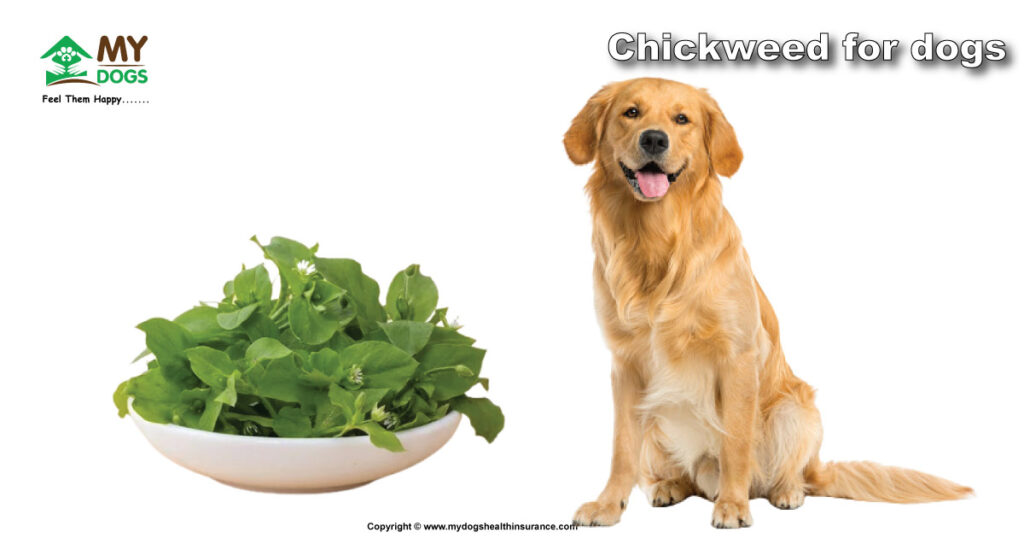
Chickweed:
Chickweed For Dogs:
- Soothing and healing for the digestive tract.
- Used to treat ulcers in the stomach, and colitis.
- Used externally as an anti-inflammatory and for all types of skin sores.

Clover (Red):
Clover (Red) For Dogs:
- Very valuable as a tonic and for cleansing the blood.
- Promotes sleep.
- Used in cancer therapy.
- An antispasmodic and expectorant.
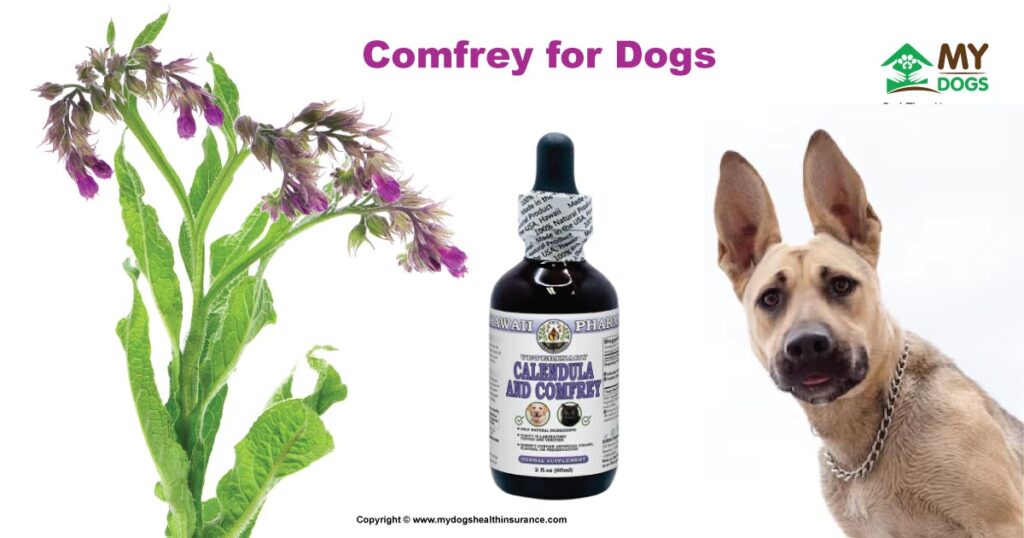
Comfrey:
Comfrey For Dogs:
- Astringent and anti-inflammatory.
- Can help with bone and ligament healing.
- Used externally as a poultice for boils, burns, and infected wounds.

Dandelion:
Dandelion For Dogs:
- A blood cleanser, and a general tonic.
- Stimulates bile flow and liver secretions.
- Good for liver and bile problems, as well as kidney problems.
- Anti-inflammatory and diuretic.
- Use the roots as tea or the leaves raw.
- Very safe.
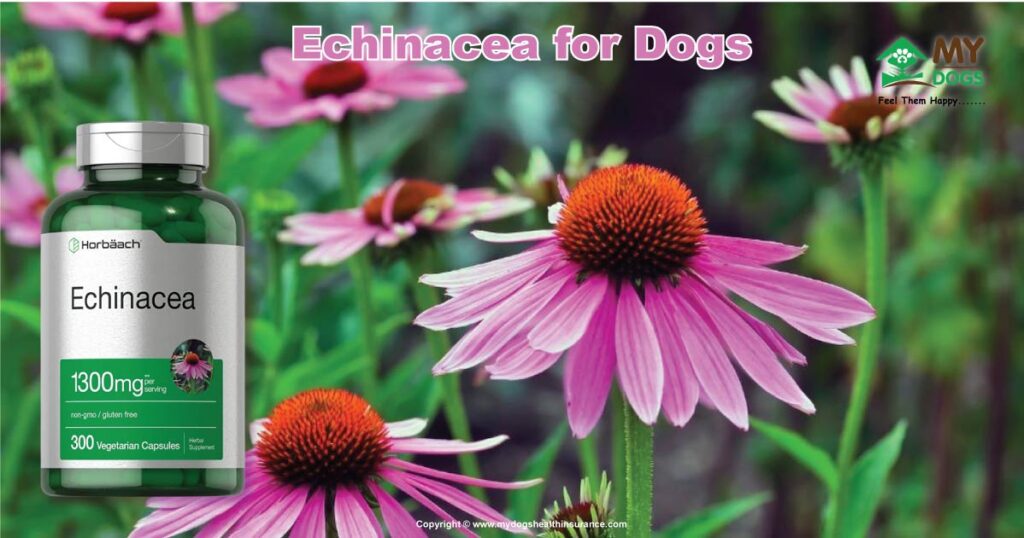
Echinacea:
Echinacea For Dogs:
- A non-specific immunostimulant, especially good for colds, flu, and other infectious problems.
- Reduces inflammation and stimulates wound healing when used topically as a poultice.
- Very safe.
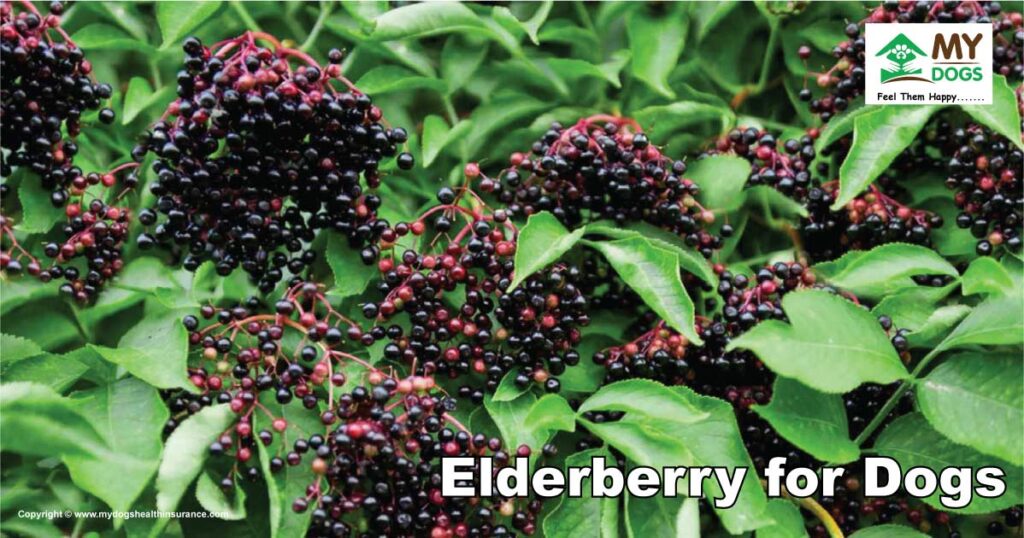
Elderberry:
Elderberry For Dogs:
- Contains antiviral compounds
- All parts of the plant are used lowers, berries, leaves, and roots.
- Roots are used for kidney problems, and as a diuretic.
- Flowers are anti-inflammatory, antiviral, analgesic, antioxidant, and anti-tumor activity.
- Leaves are used to treat eczema and ringworm.

Eucalyptus:
Eucalyptus For Dogs:
- Eucalyptus oil is an antiseptic, and useful for colds and coughs.
- Leaves are used as an expectorant and cough remedy, and also act as an antiseptic.
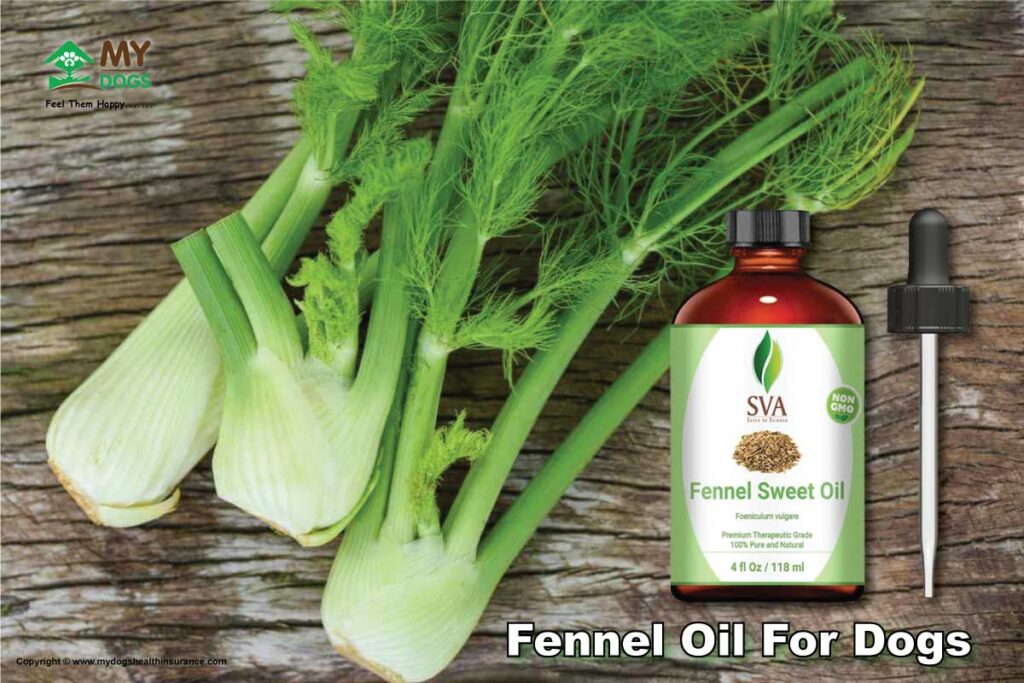
Fennel:
Fennel For Dogs:
- Anti-inflammatory, calmative, good for upset stomachs and colic.
- Helps liver regeneration.
- Fennel oil is antiseptic and bactericidal.
- May act as cancer preventative.
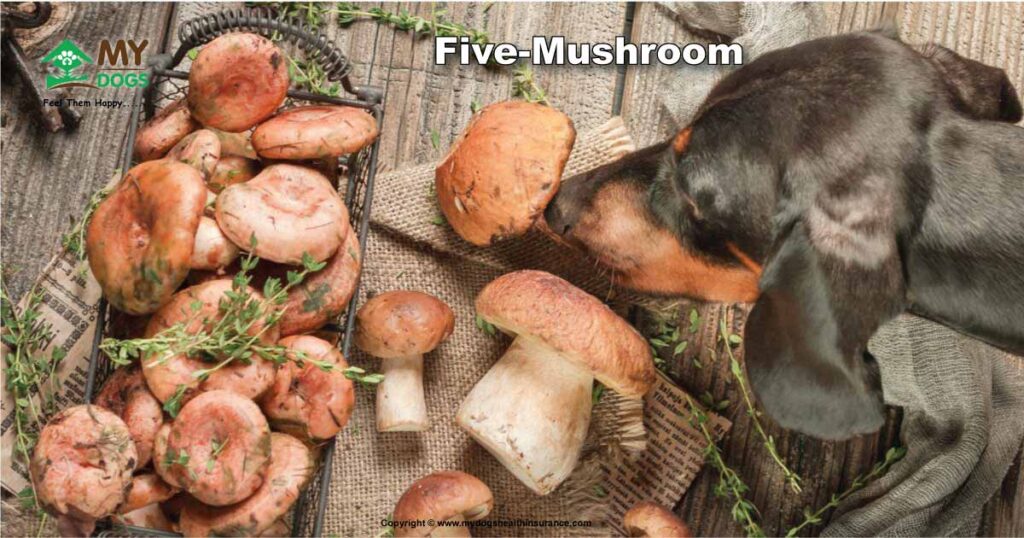
Five-Mushroom:
Five-Mushroom For Dogs:
- Extracts from five medicinal mushrooms, used as a tincture.
- Highly immune-stimulating activates the killer T-cells as part of the immune response.
- Very useful for viral infections, especially upper respiratory infections
- An important mix for treating any infection by stimulating immunity
- Used in holistic cancer therapy.

Garlic:
Garlic For Dogs:
- Used for asthma, as an antibiotic and fungicide.
- May help with diabetes, by increasing the amount of free insulin.
- Helps prevent blood agglutination (clumping).
- Excellent for the cardiovascular system as it reduces blood cholesterol and lipid levels, helps Prevent atherosclerosis, and reduces blood pressure.
- Effective against certain intestinal parasites.
- Helpful for infectious illnesses like the flu and colds.
- In folklore is said to be able to be used to treat most things!
- Avoid large doses and long-term use (may cause a certain type of anemia).

Ginger:
Ginger For Dogs:
- A digestive tonic.
- Helps settle an upset stomach.
- Useful for travel sickness.
- Antispasmodic, calms the intestines.
- used as a digestive aid and pain reliever.
- Helps protect the liver.
- Avoid large doses; use in small doses during pregnancy of female dog.
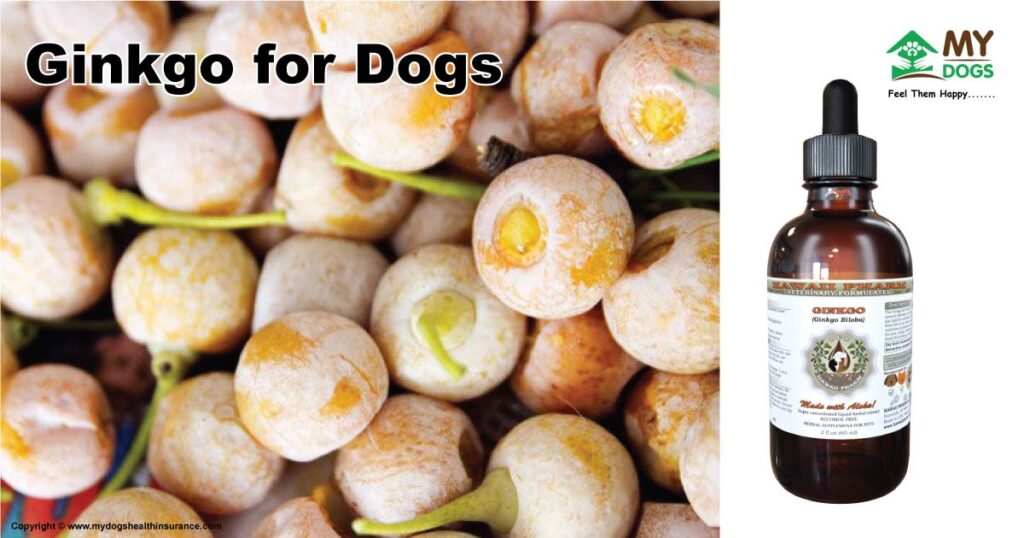
Ginkgo Biloba:
Ginkgo Biloba For Dogs:
- Useful for many geriatric conditions such as cold extremities, poor circulation, memory loss, tinnitus, and vertigo.
- Improves mental performance in geriatrics.
- Helps increase brain blood circulation.
- Has low toxicity
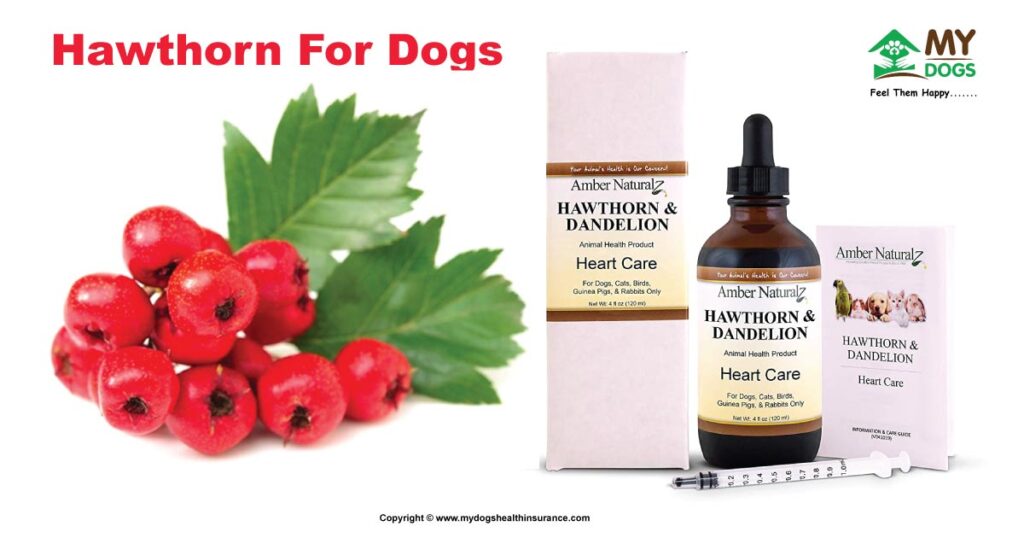
Hawthorn:
Hawthorn For Dogs:
- A gentle tonic for the heart.
- Improves blood pressure, coronary flow, and heart rate.
- Improves cardiac function, breathing problems, and fluid swellings related to heart problems.
- Has low toxicity, BUT if it is used with digitalis, use only half the dose of each herb.
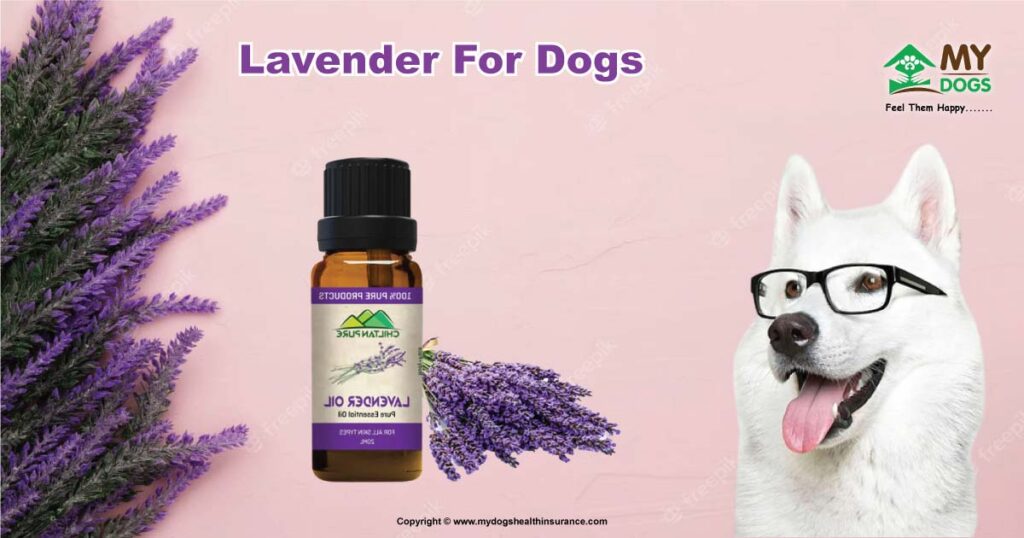
Lavender:
Lavender For Dogs:
- Antidepressant, calming,
- Can act as a tonic.
- The essential oil is useful in treating burns and acts as an antiseptic.
- Used extensively in aromatherapy.
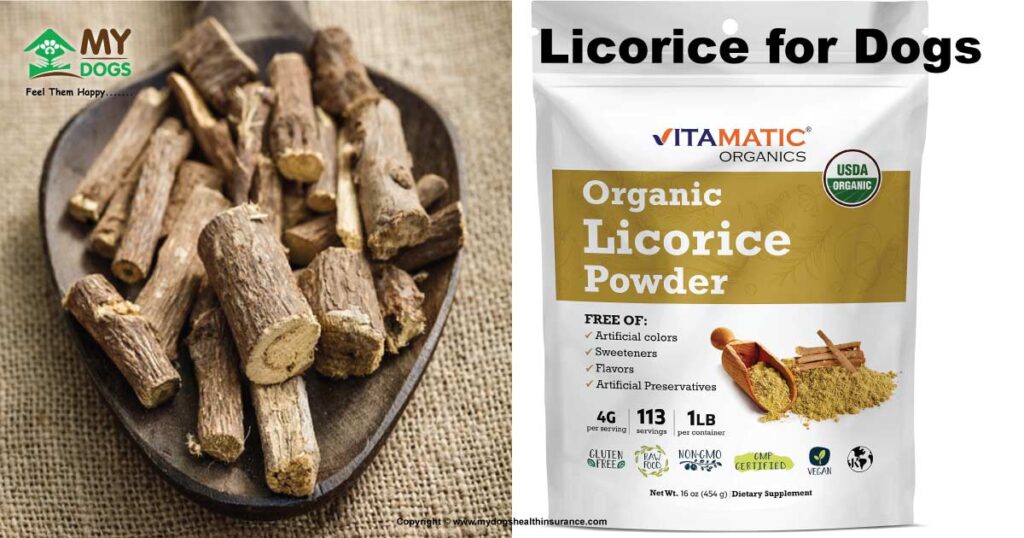
Licorice:
Licorice For Dogs:
- Very valuable as an anti-inflammatory, good for gastric ulcers, and reduces intestinal spasms.
- Contains GLA (gamma-linolenic acid), which reduces prostaglandin production and increases glucocorticoid concentration in responsive tissues.
- Can be used for itchy skin conditions.
- Stimulates the adrenal glands, which is helpful in treating Addison’s disease.
- Useful in chronic stress and tiredness related to adrenal exhaustion.
- Useful for treating coughs and colds.
- Antioxidant.
- Helps improve liver function, clears jaundice, and reduces
- Vomiting and diarrhea.
- Stimulates the immune system.
- May help with depression.
- Not for long-term or excessive use; use for four to six weeks only at a time.
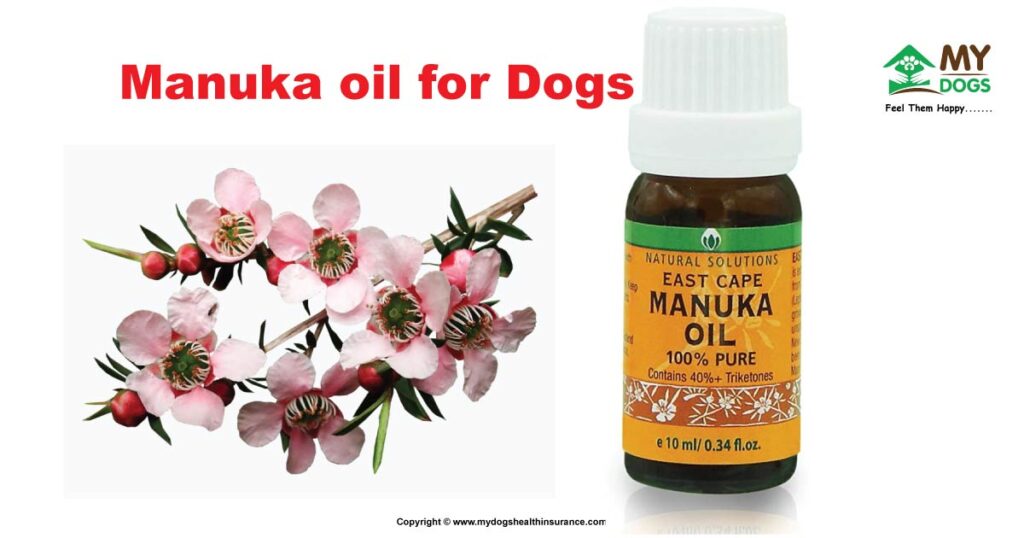
Manuka Oil:
Manuka oil For Dogs:
- The tea tree’s like it’s in New Zealand counterpart.
- Similar action to tea tree oil but is said to be more powerful.
- An excellent antibacterial and antifungal; also a good drying agent with topical use.

Parsley:
Herbs Parsley For Dogs:
Parsley is a particularly good herb for dogs, as it is rich in vitamins A and C, as well as antioxidants. It also contains a natural compound called apigenin, which has been shown to have anti-inflammatory and anti-cancer properties. Basil and oregano are also great choices, as they contain essential oils that can help improve digestion and reduce flatulence.
- Antihistamine and anti-inflammatory.
- Can act as a diuretic, and reduces stomach spasms.
- Good for kidney function.

Red Raspberry:
Red Raspberry For Dogs:
- Very useful in birthing (made into tea) and pregnancy as a tonic.
- Can help expel retained afterbirth.
- Can also be used for diabetes, diarrhea, and sores in the mouth.
- Very safe.

St. John’s wort (Hypericum):
St. John’s wort (Hypericum) For Dogs:
- Has proven antidepressant and anxiety-reducing actions.
- Anti-inflammatory,
- Used for colds, coughs, and insomnia.
- Used topically for bruises and arthritis.
- Often combined with calendula to make wound-healing lotions.
- Overuse can lead to light sensitivity (photosensitivity).
- May be of use in treating AIDS and other viruses.
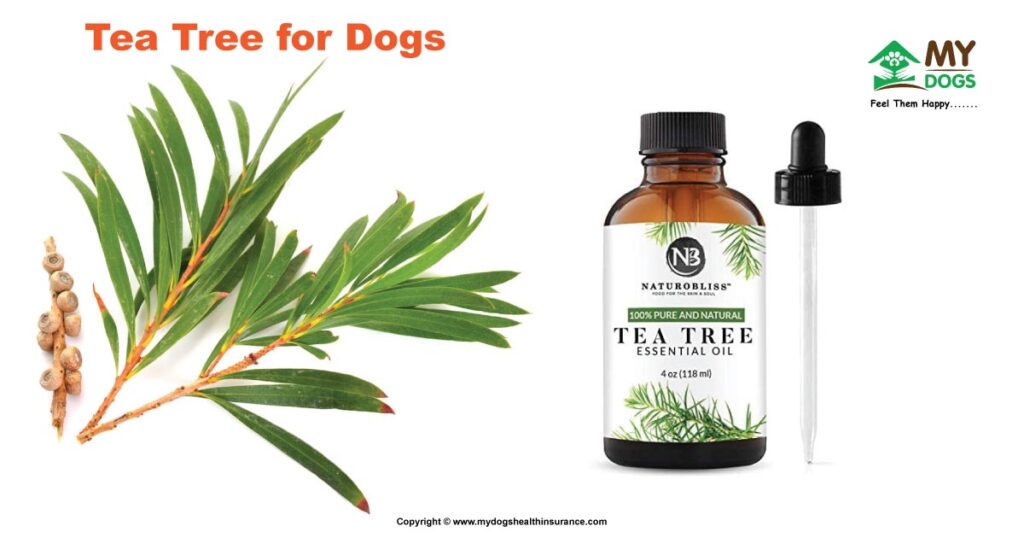
Tea Tree:
Tea Tree For Dogs:
- As an essential oil is very useful as a strong antiseptic and antifungal agent.
- Very useful in wounds, skin infections, and fungal skin problems.
- Dries out the wound, and tastes awful so discourages animals from licking the area.
- Can be used for toothache, colds, and headaches.
- Good for abscesses, bites, and burns.
Do not use it internally or in high doses.

Conclusion:
In conclusion, fresh herbs can be a wonderful addition to your dog’s diet, providing numerous health benefits and natural flavorings. With a little research and careful consideration, you can help keep your furry friend healthy and happy with the power of fresh herbs.
Note: For more informative Articles about dog Food & Nutrition, Click Here:
FAQ
Which herbs are good for dogs?
Some herbs are consider safe for dogs and can have potential health benefits. Include chamomile, ginger, parsley, peppermint, and turmeric. However, it’s important to consult with a veterinarian before giving any herbs to your dog, as certain herbs can be harmful and interact with medications. The appropriate dosage and form of the herb should also be determine by a professional to ensure the safety and effectiveness of your dog.
Are herbal remedies safe for dogs?
Not all herbs remedies are safe for dogs, as some herbs can be toxic and harmful to their health. It’s important to consult with a veterinarian before giving any herbal remedies to your dog, as they can help determine which herbs are safe and appropriate based on your dog’s individual health status, age, weight, and any medications they are taking. Some herbs are consider safe and have potential health benefits for dogs. Include chamomile, ginger, parsley, peppermint, and turmeric. However, it’s crucial to follow the recommended dosage and use the correct form of the herb, as excessive or improper use can cause adverse effects.
What is a natural remedy for dogs?
A natural remedy for dogs refers to a treatment or therapy that uses natural substances or techniques to address a health condition or promote overall wellness in dogs. Examples of natural remedies for dogs include:
- Herbs remedies: Certain herbs like chamomile, ginger, and turmeric are use to alleviate various health conditions in dogs.
- Essential oils: Some essential oils like lavender and peppermint are calm effects on dogs and can use to alleviate anxiety and stress.
- Acupuncture: This is a traditional Chinese medicine technique that involves inserting thin needles into specific points on a dog’s body to promote healing and alleviate pain.
- Massage therapy: This involves using gentle pressure and stroking motions to help reduce muscle tension, promote relaxation, and improve circulation in dogs.
It’s important to consult with a veterinarian before using any natural remedies on your dog, as some natural substances can be toxic and harmful to their health. Additionally, natural remedies are never use as a replacement for proper veterinary care and treatment.
What herbs make dogs sleepy?
Valerian is an herb that has been traditionally use for its sedative properties in humans. Some pet owners have used it as a natural remedy to help their dogs with anxiety and sleep disorders. Valerian is thought to work by increasing the levels of the neurotransmitter GABA in the brain, which has a calming effect and can help reduce anxiety and promote relaxation.
However, it’s important to note that the use of Valerian for dogs is not well studied, and the safety and efficacy of this herb in dogs are not fully known. Potential side effects such as gastrointestinal upset and dizziness are also risky.
What herb relaxes dogs?
One herb that is commonly used to promote relaxation in dogs is chamomile. Chamomile is an herb that contains compounds that may have a calming effect on dogs. It can be given to dogs in the form of tea or as a supplement, but it is important to consult with a veterinarian before giving any herb to your dog.
There are several herbs that may help to promote relaxation in dogs, but it is important to note that the use of herbs in dogs should be done under the guidance of a qualified veterinarian.


